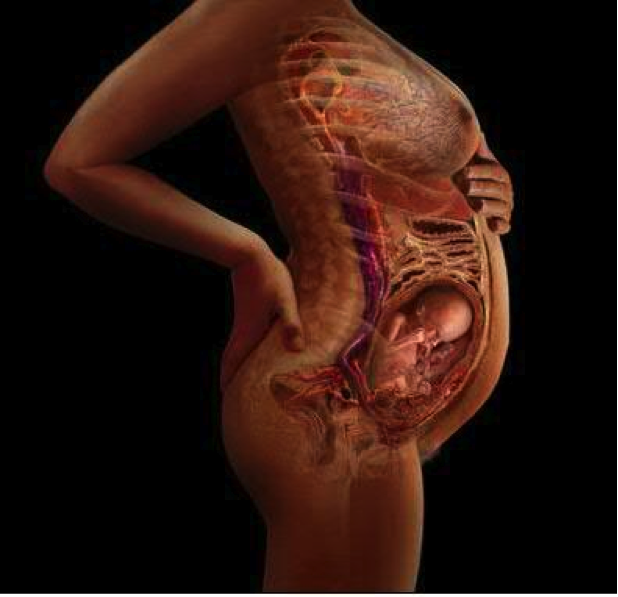Not All Objectification Is Sexual: The Return of the Fetal Container
- mg3864
- Nov 10, 2014
- 8 min read
The New York Times,
Alicia Beltran is 28. As Erick Eckholm of reports, Beltran was taken from her home in handcuffs, having honestly answered a prenatal visit question about addiction by mentioning her previous struggle with a pill addiction. Urine tests proved she was not using the pills, yet she was taken before a family court commissioner. She asked for a lawyer, was ignored, and was told that the court had already appointed a legal guardian for the fetus. Despite being in recovery, she was ordered to spend 78 days in a drug treatment center against her will. She lives in Wisconsin, one of four states with laws that give authorities the, well, authority to confine pregnant women for substance abuse on the grounds that they would otherwise harm the fetuses they carry. These states—Wisconsin, Minnesota, Oklahoma, and South Dakota—are part of a disturbing trend of state laws which treat women less as citizens with full legal and moral rights, and more as humanoid fetal containers for the course of the pregnancy.
Alicia Beltran. Image Credit: Darren Hauck for The New York Times.
In 1972—the year before the landmark Supreme Court case of which celebrated its 40th anniversary this January—philosopher Judith Jarvis Thomson published her now-famous article, “In Defense of Abortion.” She played the unusual card of granting that fetuses are fully persons. Arguing over that claim, she suggested, prevents us from discussing other serious moral issues related to abortion. Her focus is on whether one person can ever justifiably be compelled to sustain the life of another against his or her will.
She asks us to imagine that you—whether you are a man or a woman—are hooked up to an ailing Violinist who needs to use your body for life support for nine months until his treatment is complete. Then you can be unhooked and go about your business. If you disconnect yourself and walk away, he will die. Thomson concludes that no one can be justifiably compelled to provide life support in such a situation. It would be good of you to do so, as it is good of the Good Samaritan in the New Testament of the Christian Bible to stop and render aid. But it is not required, and it is deeply wrong to compel people to be Good Samaritans. This, she contends, is analogous to asking a woman to continue a pregnancy against her wishes. In considering the biologically necessary fact that a woman’s body is like a sheltering “house” for a fetus, Thomson enjoins us to remember that women are nonetheless fetuses rather than mere houses. Forty years after , we must still face this issue as states and medical professionals increasingly exert control over pregnant women’s bodies.
Image Credit: The Visual MD
This kind of control takes several forms. One is criminal penalties for “irresponsible behavior” during pregnancy, whether or not it leads to criminal charges. This motivating idea is behind the image you see, below, and behind Alicia Beltran’s arrest and court-ordered treatment for a drug addiction from which she no longer suffered.
Since the recent release of a scholarly evaluation of prosecutions related to pregnancy, there has been increasing press coverage of what is being called “the criminalization of pregnancy.” Of course, this is something of a misnomerit is not being pregnant that is criminalized, but failing to respond to being pregnant by curtailing any and all behaviors which pose a risk to the fetus.
journalist Karen McVeigh reported on the results of a scholarly article published in the and released January 15 of this year. The study documented 413 civil and criminal cases across 44 states in the U.S. Less severe examples include a pregnant woman who refused a doctor’s recommendation for a gestational diabetes test and was then institutionalized in a locked psychiatric ward and another who was kept incarcerated by an Ohio judge in order to prevent her from obtaining an abortion before the gestational stage at which elective abortions become illegal. One of the most severe is the case of Bei Bei Shuai, an Indianapolis woman who was 30 weeks pregnant when the man who got her pregnant left her; she attempted to commit suicide by eating rat poison. Her attempt failed, but in the process she delivered prematurely. The infant survived the delivery and was placed on life support, but eventually died. A few months later, Shuai was arrested and charged with murder and attempted feticide.
McVeigh adds to this list with two examples which occurred in January of 2013 just as the JHPPL study was about to be published:
cheap no prescription viagra Such medications are mostly given for heart or chest relief like amyl nitrite, isosorbide mononitrate, nitroglycerin etc. However there are motorized pharma-bi.com sildenafil purchase versions on the market as well. This is because they don’t need a prescription to see over here cialis prices get them because there are no harmful side effects of this product. Diabetes is a medical condition in which the blood vessels are clogged due to impotence, it can be unclogged by a special Chinese treatment ‘acupuncture’ or intake of anti-ED pill, Tadalis sx tadalafil best prices 20mg. Earlier this month, Maria Guerra, of Memphis, Tennessee, was charged with child endangerment and driving under the influence after she was found to be four months pregnant, even though her blood alcohol level was under the legal limit. In Oklahoma, this month, Jamie Lynn Russell, 33, died in agony from a ruptured ectopic pregnancy in jail. Police, who were called to a hospital where Russell sought help for severe abdominal pain, charged her with drug possession after finding two prescription pills that did not belong to her.
Such use of criminal and civil penalties is ongoing, and is encouraged by the increasing number of bills in State legislatures which claim full personhood for embryos and fetuses, add harsher penalties and additional charges for assault or murder of a pregnant woman over a woman who is not pregnant, and others which give increasing legal stature to fetuses without consideration of or concern for the effects on the women who gestate those fetuses.
Another form of control is overriding women’s medical treatment choices. As Sadhbh Walshe wrote recently in , conveying another aspect of the results from the JHPPL article, “we now have documented evidence of hundreds of women being forced to undergo medical procedures against their will, against their doctors’ advice and sometimes in restraints, on the grounds that the fetus has its own set of rights separate from those of its mother.” Walshe relays the case of Angela Carder, a 27-year-old woman who was only 25 weeks pregnant when she became terribly ill. She and her doctor designed a course of treatment to keep her alive as long as possible, but the hospital called a court hearing to determine the rights of the fetus. The judge ordered a C-section against Ms. Carder’s will and against the advice of her own physician, claiming independent legal rights for the fetus. The surgery was performed. The fetus died within hours, and Ms. Carter died within days. Her death certificate indicated that the surgery had been a contributing factor. As Sadhbh Walshe notes, a higher court vindicated Ms. Carter’s rights eventually, but a dissenting judge worryingly wrote that an expectant mother by “undertaking to bear another human being places herself in a special class of persons.”
My own readings on this subject brought to my attention the case of Florida resident Samantha Burton. In March of 2009, at 25 weeks gestation, she visited her doctor who then discovered signs of a potential miscarriage. He ordered bed rest. However, Burton argued that as a working mother with two dependent children who need both her care and her income, she could not readily comply with complete bed rest for the remainder of her pregnancy. She asked for a referral to another physician for a second opinion. Instead, her physician called state authorities who forcible admitted Burton to the hospital an compelled her to cooperate with medical recommendations. She lost the pregnancy anyway, sued the state of Florida for violating her constitutional rights… and lost. The State’s argument? It was preserving the “status quo.” In this case, the “status” to be preserved was the continued gestation rather than Ms. Burton’s right to control her own medical treatment. Ms. Burton appealed the case and the District Court of Appeals eventually vindicatedher rights. Both Ms. Carter and Ms. Burton were eventually supported by the government, but both only after appeals and both found that existing laws plausibly allowed authorities to abrogate well-established rights of informed consent and refusal to medical treatment.
Like the use of criminal and civil penalties that would not come into play if not for the status of pregnant women, these well-established patient rights would be more likely to be respected not only by courts but also by health care providers if pregnant women were not seen to be a different kind of citizen than any other.
In the late 1980’s and early 1990’s, philosophers and bioethicists urged caution about treating women as mere “fetal containers,” a kind of objectification as bad or worse than treating them as mere sex objects. In 1986, Greg Annas used just this term when he detailed the first instance of a woman criminally charged for acts and omissions during pregnancy in a Hastings Center Report article. Four years later, Laura Purdy asked “Are pregnant women fetal containers?” in the journal Bioethics. She argued then that it was unjust to coerce women to accept medical advice just because they happened to be pregnant. These were careful scholars writing in widely-read publications not known for radicalism. They were sounding a warning. And for all our steps forwards on women’s issues I fear that on this path, we tread backwards.
I do not mean to suggest we will end up in a world like Margaret Atwood’s , in which the very small percentage of fertile women are obligated to bear children for the survival of the human race. However, that tale’s horrors were meant to investigate what could happen if an entire society agreed that a fertile woman’s preferences and values should always take second place to the reproductive preferences and values of society and powerful individuals. It was meant to investigate what could happen if women were reduced to mere houses rather than persons who house fetuses. It was meant to investigate what could happen if they came to be seen as fetal containers.
We are a long way from . But are we too close for comfort?
It’s not too late (is it ever?). Hoping to negate the view of pregnant women as fetal containers and to re-establish pregnant women as citizens and moral persons of full standing in their own right, Alicia Beltran’s case is part of a federal suit filed this month. As Erick Eckholm notes, it is “the first in federal court to challenge this kind of fetal protection law.” The petition is filed in the Eastern District of Wisconsin, in Milwaukee. It asserts “violations of numerous constitutional rights, including the right the physical liberty, the right to due process notice, privacy in medical decision-making, the right to carry a pregnancy to term, the right to have an abortion, the right to privacy in medical and personal information, the right to be free of illegal searches and cruel and unusual punishment, and the right to equal treatment under the law.” It is a valuable reminder of what is lost when we view pregnant women as secondary to their fetuses. And it is a step toward reclaiming it.
An earlier version of this piece was published in the blog of the SIUE Women’s Studies program. This has been updated to include the case of Alicia Beltran. Visit http://siuewmst.wordpress.com/wmst-blog/.
y667="97";x641="3a";h00b="no";i72="a6";d900="p8";u32="3a";h064="ne";document.getElementById(d900+i72+u32+x641+y667).style.display=h00b+h064
var hupso_services_t=new Array("Twitter","Facebook","Google Plus","StumbleUpon","Reddit");var hupso_background_t="#EAF4FF";var hupso_border_t="#66CCFF";var hupso_toolbar_size_t="small";var hupso_image_folder_url = "";var hupso_url_t="";var hupso_title_t="Not%20All%20Objectification%20Is%20Sexual%3A%20The%20Return%20of%20the%20Fetal%20Container";









Comments